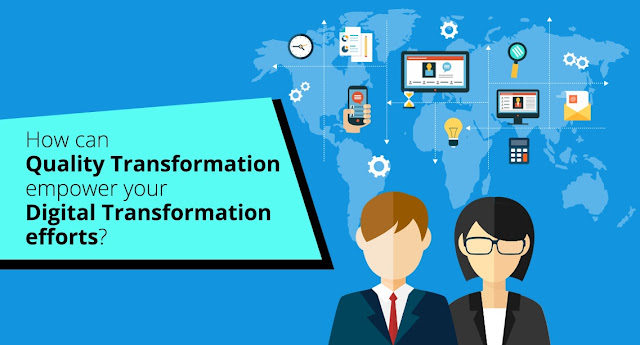What is the scope of digital transformation in the healthcare industry?
 | |
| Digital Transformation |
In the past few years, the healthcare sector
has been aiming to join other sectors such as banking, insurance, media,
retail, and travel in a quest to deliver superior customer experiences. The
healthcare industry has been striving to create a fundamental shift from volume
to value-based care. Driven by the need to deliver a better customer
experience, the healthcare sector is leveraging digital transformation services. In fact, healthcare
providers from across the world are constantly involved in digitizing their services
to achieve greater life expectancy for individuals. The salvo of digital business transformation in the
healthcare sector has triggered a tectonic shift, even obliging third party
care providers such as insurance companies to modify their approach. This is
done by executing out of the box digital transformation solutions.
Digital
transformation in the healthcare sector
is rapidly proving to be a game-changer by large-scale deployment of artificial
intelligence and automation. For example, the introduction of chatbots to
replace human interaction helps reduce costs and the need to consult a doctor
in person. Digital transformation
promotes a shift in the processes and behavior while encouraging innovation in
creating new business models by connecting customers, partners, suppliers, and
stakeholders.
A comprehensive overhaul of user experience in
the healthcare sector to bring about innovative and superior quality is a daunting
task. However, the medical practitioners and clinics that prioritize patient
experience would see an increase in satisfaction. According to a survey by
Harvard Business Review, the majority of patients (approx. 97 %) were
completely satisfied with their first telehealth experience leading to an
improved relationship with their care providers.
Superior quality care is just a snapshot of
what the healthcare industry could provide if the digital transformation becomes
a priority for the entire industry. Let us take a closer look at how digital transformation strategy is
changing current practices of the healthcare industry:
Rapid Adoption of cloud
services for operational dexterity:
Cloud computing has become an enabler of digital business transformation. Harnessing
the advantages of cloud can develop dynamic and robust
infrastructure that enhances operational efficiency by accelerating the service
delivery process. Boundaries between business processes and clinical services
can be erased by connecting people across the formerly siloed structures while
simplifying access to information. For example, a Canadian hospital has
successfully streamlined its clinical processes to offer seamless enterprise
workflow while simultaneously reducing the implementation time through cloud
services of IBM® BlueWorks Live (a business process management software - SaaS).
The cloud is highly efficient for healthcare providers to leverage a consumer
driven approach to achieve long-term growth with improved ROI.
Big data analytics in
reshaping the dynamics of the healthcare sector:
Big data proactively helps to combine
information about a business through various channels such as online
transactions, social media, e-commerce portals and unravel trends for future
use. For the healthcare sector, big data is facilitating a lesser rate of
medication errors, better preventive care, and accurate staffing.
- Better preventive care: A substantial number of patients who step into the emergency rooms are often known as "frequent flyers" as they account up for twenty-eight percent visits. Big data helps to recognize these people and develop preventive plans to keep them away from returning.
- A lesser rate of medication error: With patient record analysis, big data easily flags any inconsistencies between prescribed drugs and patient's health. It can then alert the medical practitioners when there is a potential risk of error.
- Accurate staffing with predictive analysis: Predictive analysis being a part of digital transformation services helps clinics and hospitals to estimate future admission rates and allocation of proper staff to deal with patients. This approach helps to save money while minimizing the emergency room wait times.
Role of Artificial
Intelligence in healthcare:
Artificial intelligence is another nascent digital transformation implementation in
the healthcare sector, which can emulate humans in decision making and
processing critical information. Artificial Intelligence has definitely opened
up new avenues of digital innovation in healthcare
application by enhancing the accuracy and speed of diagnosis. With
the implementation of data analytics, medical practitioners can now use
different approaches to treatment. AI-powered body scans can now identify
chronic diseases like cancer in the early stages, thus bringing down the
mortality rate. For example, during the outbreak of Ebola scare, AI was
implemented to scan existing medication to explore the chances of reformulating
them. This helped to discover an effective treatment against the deadly virus.
It has been estimated that by 2020, the average expenditure on artificial
intelligence by healthcare providers would touch fifty-four million dollars.
Telemedicine solutions for
nations with large populations
Telemedicine has emerged as the most
important aspect of digital
transformation services in the healthcare sector. When it
comes to larger countries with huge population like India, China, and the USA,
where the access to healthcare services is restrained, telemedicine can play a
pivotal role. In the present scenario, where the wait times have been
increasing, telemedicine can offer a seamless access to specialists for patients
from all locations. The growth opportunities of telemedicine in Digital Transformation Solutions have
now become everlasting with the launch of wearable gadgets. This has enabled real-time
monitoring of patients without admitting them to the hospital.
Conclusion:
To succeed and thrive in the new digital
landscape, healthcare providers must create more customized patient care that
offers real-time care and accessible visual demonstration of data. For
organizations to thrive in a digitalized industry they must begin generating
ideas and implementing digital
transformation strategy, to generate a business model to facilitate
their operational capabilities and organizational strengths.
Diya works for Cigniti Technologies, Global
Leaders in Independent Quality Engineering & Software TestingServices to be appraised at CMMI-SVC v1.3, Maturity Level 5, and is also
ISO 9001:2015 & ISO 27001:2013 certified.
Check out this white
paper to know the significance of Developing a Comprehensive Testing
Strategy for Digital Transformations.


Comments
Post a Comment